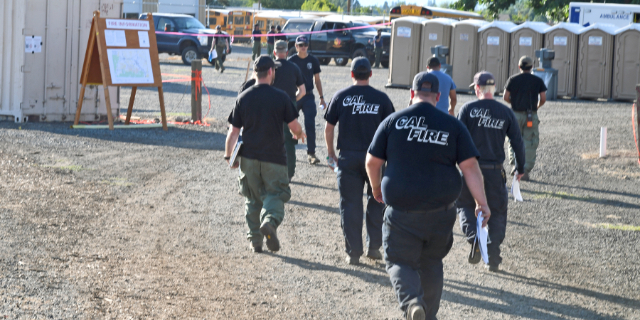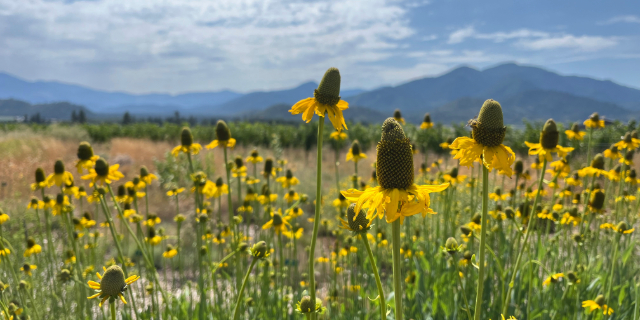Stranded sea turtle found near Coos Bay released a year later
Published 11:15 am Saturday, December 2, 2023
The tides had taken a turn for the worst for the sea turtle dubbed “Pumpkin” in October 2022.
Trending
The endangered Olive Ridley sea turtle washed ashore at Horsfall Campground in Coos County. The sea turtle was found to be cold-stunned — a condition that can render them incapable of eating or navigating.
“Sea turtles can forage the open ocean off Oregon’s shores without issue during the summer — but if they don’t turn south before the weather changes, they risk getting caught in cold currents and winter storms,” said Courtney Klug, communications and marketing specialist with the Oregon Coast Aquarium in Newport.
“As such, Oregon sees a marked increase in sea turtle strandings between fall and spring,” she said.
Trending
Over the course of a year, a collaboration between caring professionals would turn Pumpkin the sea turtle’s stranding situation into a survival story.
Those involved in the rescue of the endangered sea turtle say it was a series of key pieces that came together to make the rehabilitation a success.
“The citizen who first reported the animal did so quickly, and stayed nearby to observe the animal and help responders find it in a timely manner,” said Klug.
The Oregon Department of Fish and Wildlife responded to the initial stranding. They secured the sea turtle and transferred it to Florence, where they met staff from the Oregon Coast Aquarium.
“From there, our dedicated team of aquarists sprang into action,” Klug said.
The Oregon Coast Aquarium in Newport is one of three wildlife rehabilitation facilities in the Pacific Northwest, and the only one in Oregon, authorized by the U.S. Fish and Wildlife Service to provide specialized care to endangered marine life, like sea otters and sea turtles.
Aquarium staff determined newly-dubbed Pumpkin was a sub-adult female. Lethargic and cold-stunned, she required round-the-clock monitoring and treatment.
Cold-stunned turtles present a unique challenge, aquarium representatives said. To avoid shocking the animal, their body temperature must be raised slowly.
Pumpkin arrived at the Oregon Coast Aquarium with a body temperature just below 60 degrees Fahrenheit. She was transferred to increasingly warm water baths, raising her body temperature five degrees per day until it reached a 75-degree temperature.
At the same time aquarium staff were providing care — they were also coordinating with other wildlife facilities to establish long-term rehabilitation and release plans.
“Sea turtles are often stabilized at the aquarium and then transferred to facilities such as SeaWorld San Diego, who can provide prolonged care and arrange to release turtles to the warm waters off the coast of California,” Klug said.
After receiving confirmation that SeaWorld San Diego staff were prepared to take in Pumpkin, a flight plan unfolded.
The transport to San Diego was made possible by Turtles Fly Too, a non-profit organization that coordinates and facilitates the use of general aviation to transport endangered species and critical response teams, while educating communities on marine life conservation.
Volunteer pilot Peter Lewis, dubbed the “Turtle Flier,” flew a Socata TBM 700 Turboprop from Santa Barbara, California, to Newport.
“The turtle, nestled in a custom-made stretcher and crate, was loaded onto the plane, and they departed for San Diego,” aquarium representative Klug said.
In the following months, the SeaWorld Rescue team helped Pumpkin build up the strength to swim on her own, getting her to a healthy weight and activity level.
About a year after her rescue, Pumpkin was successfully returned to the ocean.
“This crucial success is made possible thanks to collaborative efforts,” Klug said.
The Oregon Coast Aquarium, the Oregon Department of Fish and Wildlife, the National Oceanic and Atmospheric Administration, Turtles Fly Too, and SeaWorld San Diego and Rescue worked together to support the turtle through every phase of its recovery, Klug said.
“The Oregon Coast Aquarium is committed to Oregon’s marine wildlife and will continue these efforts with the belief that even one saved animal can help species recovery,” the aquarium representative said.
All seven remaining sea turtle species are at risk of extinction due to threats like habitat loss, pollution, and entanglement.
“By doing everything in our power to care for and return injured and stranded turtles to the ocean, we can help support species’ survival,” Klug said.
“Many view sea turtles as magical, charismatic creatures—and they are. They play a vital role in supporting ocean health by maintaining sea grass beds and transporting nutrients to nesting dunes,” Klug said.
If you find a sea turtle on the beach, do not attempt to move the animal. Placing it back in the water increases its risk of injury and delays potential rescue efforts.
Instead, immediately contact the Oregon State Police Tipline at 800-452-7888 or the Marine Mammal Stranding Network (MMSN) in Oregon, Washington, and California at 1-866-767-6114.










